The BBC Glastonbury controversy has erupted into a full-blown media firestorm after the British Broadcasting Corporation livestreamed a performance by rap duo Bob Vylan, during which chants of “Death to the IDF” were aired without censorship.
The moment, broadcast during the 2024 Glastonbury Festival, has drawn condemnation from government officials, international observers, and watchdogs alike.
Table of Contents
The Incident: Chants Broadcast Live
On Saturday afternoon, during one of the UK’s most iconic music festivals, BBC viewers watching the Glastonbury livestream witnessed Bob Vylan leading a massive crowd in political chants, including “Free, Free Palestine” and the highly controversial “Death, Death to the IDF,” referencing the Israeli Defense Forces.
The performance was not censored or interrupted by BBC producers at the time, despite an on-screen advisory warning about “strong and discriminatory language”. The decision to continue airing the content has since fueled the now headline-dominating bbc glastonbury controversy.
Political and Institutional Reactions
The backlash was immediate. Prime Minister Keir Starmer called the incident “appalling hate speech” and demanded answers from the BBC. He questioned how such a moment could be allowed on a publicly funded broadcast.
The Israeli Embassy in London issued a statement labeling the broadcast as “deeply disturbing,” adding that such inflammatory rhetoric could incite violence and hatred.
Meanwhile, Ofcom, the UK’s broadcasting regulator, confirmed that it is “very concerned” and is reviewing the incident under its media standards framework. A formal investigation into the BBC’s editorial judgment is now underway.
BBC’s Response to the Glastonbury Livestream
Under pressure, the BBC admitted that it should have pulled the livestream. In a follow-up statement, the corporation acknowledged the performance contained “antisemitic sentiments” and reiterated its stance against incitement to violence.
“We respect freedom of expression but stand firmly against hate speech and violence. This content should not have been broadcast”, the BBC stated.
Despite the apology, critics argue that the BBC’s initial on-screen warning was insufficient, especially given the gravity of the language used during the performance.
Who is Bob Vylan?
Formed in 2017, Bob Vylan is a London-based punk-grime duo known for its politically charged lyrics and anti-establishment themes. The artists often tackle topics like racism, masculinity, and systemic oppression.

Following the performance, frontman Bobby Vylan took to social media to defend the chants, stating that they reflect “the frustrations of oppressed people” and arguing that protest through music is a vital form of expression.
“Teaching our children to speak up for the change they want and need is the only way to make this world a better place”, he wrote.
Additional Fire: Kneecap’s Controversial Set
Bob Vylan’s performance wasn’t the only politically charged act at Glastonbury. Irish-language rap group Kneecap also led chants of “Free Palestine,” stirring further controversy. One of the band’s members has previously been charged under the Terrorism Act for waving a Hezbollah flag during another performance.
The proximity of these acts has further amplified the bbc glastonbury controversy, with critics pointing to a failure of editorial oversight and security screening.
Strategic Implications and Timing
The timing of the controversy is especially volatile. Since the war between Israel and Hamas reignited in October 2023, Gaza’s Health Ministry reports over 56,000 Palestinians have been killed, with over 132,000 injured. Israel maintains that its strikes are targeted against militants, though critics argue that civilian casualties continue to rise at an unacceptable rate.
International pressure has intensified, with countries like Canada, France, and the UK previously condemning what they describe as “egregious” military actions in Gaza. In this climate, the airing of such chants on the BBC—long regarded as a global broadcasting standard—has magnified the fallout.
Media Ethics and Public Responsibility
At the heart of the bbc glastonbury controversy lies a deeper debate: How far should media go to protect free speech? When does protest cross the line into incitement?
Analysts suggest this controversy could become a landmark case in media ethics, especially concerning public broadcasters. With millions of British households funding the BBC through licensing fees, the institution faces mounting pressure to review its editorial guidelines and reinforce its accountability mechanisms.
Public and Legal Response
British police have confirmed they are reviewing video footage from the festival to assess whether any criminal offenses have occurred under hate speech or incitement laws. If charges are brought, it could set a legal precedent affecting both performers and media outlets.
Meanwhile, Glastonbury organizers have yet to comment directly on the bbc glastonbury controversy, though festival policies typically distance themselves from political messaging without prior approval.
Conclusion: A Moment That Echoes Far Beyond Glastonbury
The bbc glastonbury controversy is more than a broadcasting slip—it’s a collision of politics, performance, and media responsibility during one of the world’s most-watched cultural events. As the investigation unfolds, one question remains: Is this a turning point for how freedom of expression is balanced with public accountability?
FAQs about the BBC Glastonbury Controversy
What is the BBC Glastonbury controversy?
It refers to the backlash against the BBC for broadcasting a Glastonbury performance where Bob Vylan led chants including “Death to the IDF,” prompting claims of antisemitism and incitement.
Did the BBC respond to the backlash?
Yes, the BBC admitted it should have pulled the stream and condemned the chant as unacceptable hate speech.
Is there an investigation underway?
Yes, Ofcom and other authorities are reviewing the incident, and British police are also examining the footage.
What is the public reaction?
The reaction has been polarized, with some defending it as protest and others condemning it as hate speech. Public trust in the BBC has been called into question.
What are the implications for the BBC?
The broadcaster may face sanctions, legal scrutiny, and public pressure to reform its editorial and compliance policies.
🔗 For more coverage of global media and political flashpoints, visit: www.documentarytimes.com